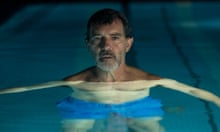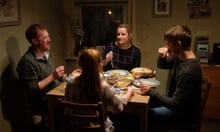Brazilian auteur Kleber Mendonça Filho, here co-directing with his producer and production designer Juliano Dornelles, has relinquished the quieter, more humanistic tones of his earlier pictures for this disturbing ultraviolent freakout. Set deep in the north-eastern Sertão – the Brazilian outback – it mashes up many themes and influences, but is chiefly a scream of satirical defiance against new president Jair Bolsonaro, the far-right globaliser who made his international statesman debut at Davos this year, famously promising to make the country more open to foreign trade. This movie’s closing credits pointedly note that the production created 800 jobs.
Bacurau is a hallucinatory trauma with something of Alejandro Jodorowsky, or Ted Kotcheff’s Wake in Fright. It is also a paranoid revenge western that reminded me of Clint Eastwood in A Fistful of Dollars, brusquely specifying the number of coffins that should be made ready. The setting – Baracau – is fictional; the name itself means “nighthawk”.
We are a few years into the future, in a world where executions of convicted criminals in São Paulo are broadcast live on TV. A young woman called Teresa (Bárbara Colen) has returned to her hometown, for the funeral of her grandmother. She’s got a ride to this remote place with the guy who delivers drinking water in a giant tanker. The people of Bacurau need the water because of a dispute with regional authorities concerning the dam, in which a malign role is played by oleaginous politician Tony Jr (Thardelly Lima). She has also brought some pharmaceuticals for the local doctor, Domingas, played by the veteran Brazilian star Sônia Braga, who was in Filho’s previous movie, Aquarius. Pill-popping seems to be a tradition in this place, the tablets being reverently placed on the tongue, and the locals are intensely aware of its mysterious past. There is a museum of Bacurau history, a building that is more important than the church, and ends up playing a fateful role in the town’s destiny.
The funeral itself unsettles and upsets many, particularly Domingas, and people thereabouts are generally aware that something very strange is happening. They can no longer find Bacurau on Google Maps, or any GPS system. Their old-fashioned maps in the schoolhouse show Bacurau, but the modern world of digital surveillance sees only rock and dust. Moreover, the locals’ mobile phones no longer work. There is no signal – a time-honoured horror-movie sign of something awful about to happen.
The disquieting thing is that a bunch of foreign tourists have holed up in a hunting lodge near Bacurau, armed to the teeth with extremely hi-tech gear. They are evidently on some kind of safari package, under the guidance of Michael, an ageing German played by Udo Kier. (Again, that casting is never a reassuring sign.) He is presiding over what is effectively a recreational slaughter militia: a pack of extremely wealthy Americans, Brits and others who are putting their money into Brazil. But what raw material does Brazil have that might facilitate this new service economy, with the cooperation of the central political establishment?
As it happens, the people of Bacurau exist in a world that is disturbing enough without Kier and his tetchy customers. Teresa enters into a relationship with Pacote (Thomas Aquino), a local semi-reformed gangster with a connection to a Ned Kelly figure called Lunga (Silvero Pereira). There is a cultural strain of banditry in Bacurau, or perhaps more specifically, a mutinous type of Bolivarian resistance.
There is also a sliver of sci-fi weirdness, created by the appearance of a drone that has been made to resemble an old-school flying saucer. Perhaps Filho is telling us that this is not just fantasy, not just symbolism – it is the shape of things to come. Or he could be telling us that to rise up against oppression, these people will not only need or want arms, but also psychotropic drugs to give themselves the ultra-Dutch courage, or simply to make the place too ungovernably mad to be controlled.
It is a really strange film, beginning in a kind of ethno-anthropology and documentary style, becoming a poisoned-herd parable or fever dream and then a Jacobean-style bloodbath. It is an utterly distinctive film-making, executed with ruthless clarity and force.










Comments (…)
Sign in or create your Guardian account to join the discussion